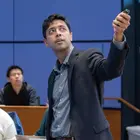Yale Researchers Receive Grant to Test Water Entrepreneurship Solutions to Climate Change in Bangladesh
The grant will fund a randomized controlled trial of new technology that allows local business owners to treat and sell desalinated water to their communities.

A global development policy research initiative founded by Mushfiq Mobarak, the Jerome Kasoff ’54 Professor of Management and Economics, has received a $1.3 million grant to design and evaluate a water entrepreneurship program in Bangladesh to address climate change-induced water salinity.
Mobarak is the faculty director of the Yale Research Initiative on Innovation & Scale (Y-RISE), which convenes researchers in economics and political science to determine how governments and nonprofits can expand anti-poverty interventions that have proven effective in small-scale trials. This project focuses on coastal Bangladesh, where the water supply is burdened by both arsenic contamination and rising sea levels that have caused freshwater sources to flood with saltwater.
“Millions of lives and livelihoods have been altered due to climate change and salinity intrusion, and are now at risk,” Mobarak said.
To address this problem, Y-RISE has partnered with BRAC, and international development founded in Bangladesh, to introduce reverse osmosis (RO) water treatment technology in the affected areas, designing a new program to create water entrepreneurs who will treat and sell desalinated water within their communities.
With a grant from GiveWell, a nonprofit that funds cost-effective policy interventions, BRAC and Y-RISE are implementing a two-year randomized controlled trial to test the program’s effectiveness. The trial will involve 10,950 households and measure the number of households who decide to purchase clean water, the effects of different economic incentives on technology uptake, business outcomes for the entrepreneurs, and health outcomes such as the prevalence of hypertension and preeclampsia in pregnant women, two conditions associated with the current water supply. BRAC’s microfinance arm will provide $2 million in business loans to local entrepreneurs, and the organization will use the trial’s findings when determining if and how to scale this project in Bangladesh.
This project is part of a broader collaboration between BRAC, Mobarak, Y-RISE postdoctoral scholar Islamul Haque, and several other researchers to address climate change in coastal Bangladesh through evidence-backed solutions.
“This is a financially feasible and potentially scalable way to reach the 20 million people who are suffering from high levels of salinity in their drinking water, without having to rely on external donor funds,” Mobarak said. “This has the potential to become a cost-effective indigenous solution.”



